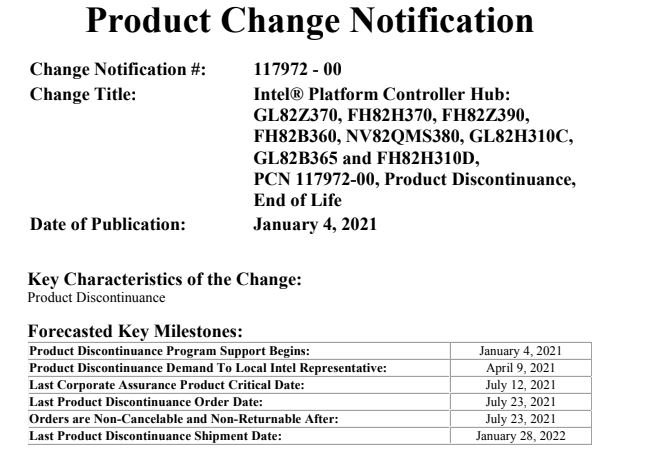
Intel to Discontinue 300-Series Chipsets for ‘Coffee Lake’ Processors
- Intel sets the end of the road for 300-series chipsets, giving it about a year from now.
- PC building DIYers and upgrade freaks using ‘Coffee Lake’ should move quickly.
- Intel is losing ground in the market and has to allocate its production resources to newer products.
Intel has released a product change notification stating that the 300-series chipsets will reach the end of support by January 2022, with the “end of life plan” starting immediately. That is the chipset released for the second revision of the LGA 1151 socket designed for the ‘Coffee Lake’ CPUs back in 2017.
The 300-series chips only support this CPU generation natively, and the 9th-gen refresh with BIOS update. To get a clear idea, we are talking about H310, B365, B360, H370, Q370, Z370, and Z390.
Intel has already replaced this generation with the series-400 chips that came out for LGA 1200 and the ‘Comet Lake,’ and very soon, we expect to see the first models of the 500 series chipsets made for the ‘Rocket Lake’ generation. After that, there’s the ‘Alder Lake’ and a new LGA 1700 socket that isn’t very far anymore, and as we explained before, you may want to wait for that generation instead.
Back to the 300-series, you may be wondering what this new product plan means for you, so here we go. If you’re planning to build or upgrade a system using a ‘Coffee Lake’ processor, this is the final year to do it, preferably until this July. While you may find motherboards with these chipsets after January 2022, they will be rare and in very limited stock. Also, you should expect to receive no BIOS updates on these motherboards anymore.
On the mobile space, you should expect to see no new laptops launching with ‘Coffee Lake’ after July 2021, which is good from the standpoint of having more energy-efficient 10nm chips running in portable machines. So, the chances of having low-cost models are now slimming down even further. That’s the natural cycle of tech products, though, but the news here is that the EOL comes too early compared to past generations.
Essentially, the 1151 socket is being phased out, and if that’s too soon for some consumers, it is just business for Intel. Possibly, the American chipmaker simply wants to free up production resources and allocate them where it matters, as the company is dealing with unprecedented difficulties, shortages, and fierce competition. Intel just can’t afford to pay any attention to older generations, even if that comes at the cost of pushing future customers to AMD, which is surprisingly proving more reliable on taking care of backward compatibility.







